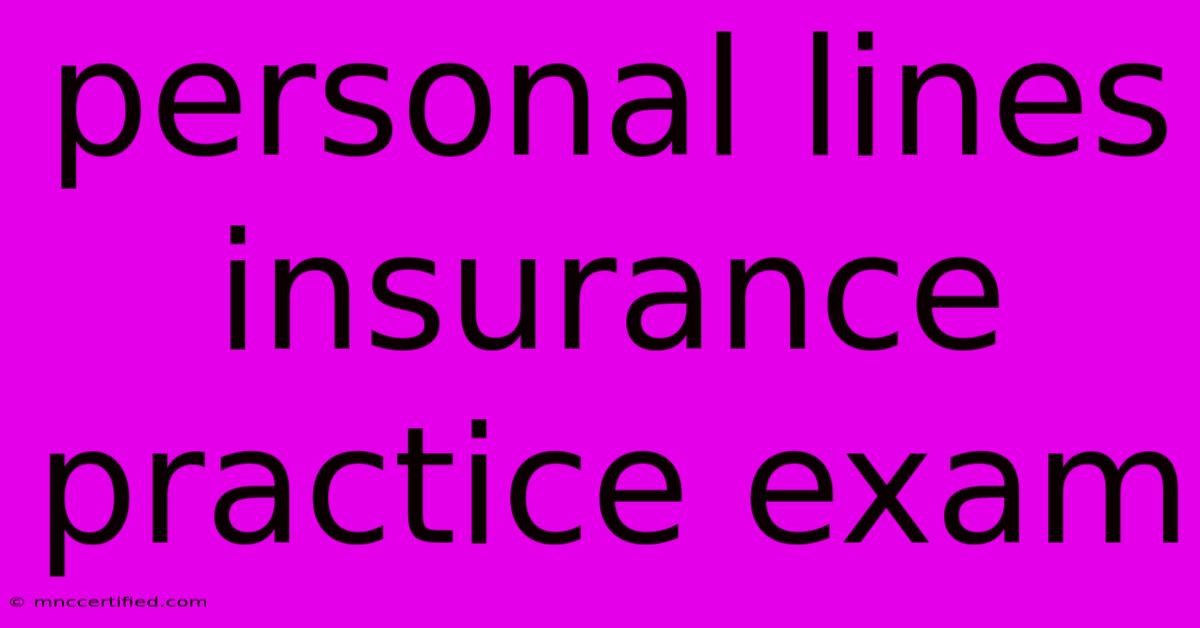Personal Lines Insurance Practice Exam

Table of Contents
Ace Your Personal Lines Insurance Exam: A Comprehensive Study Guide
Are you preparing for your personal lines insurance exam? This comprehensive guide will equip you with the knowledge and strategies you need to pass with flying colors.
Understanding Personal Lines Insurance
Personal lines insurance is a crucial part of protecting individuals and their assets. It encompasses a range of coverage, including:
- Homeowners Insurance: Protects your home and personal belongings against damage or loss due to fire, theft, natural disasters, and other covered perils.
- Auto Insurance: Provides financial protection against liability for accidents and damage to your vehicle.
- Renters Insurance: Offers coverage for personal belongings and liability in rented properties.
- Umbrella Insurance: Extends your liability coverage beyond the limits of your primary policies.
- Recreational Vehicle Insurance: Protects your motorhomes, trailers, and other recreational vehicles.
Key Exam Topics to Master
To excel in your personal lines insurance exam, focus on these essential topics:
1. Insurance Concepts and Principles:
- Risk Management: Understanding the concept of risk and how insurance helps mitigate it.
- Insurance Policy Components: Key elements like declarations, definitions, coverages, exclusions, and endorsements.
- Types of Insurance Policies: Distinguishing between different types of policies like named perils and all-risk coverage.
- Insurance Contracts: Understanding the legal framework of insurance agreements, including the principle of utmost good faith.
2. Personal Lines Policy Coverages:
- Homeowners Insurance Coverages: Dwelling, personal property, liability, and additional living expenses.
- Auto Insurance Coverages: Bodily injury liability, property damage liability, collision, comprehensive, and uninsured motorist coverage.
- Renters Insurance Coverages: Personal property, liability, and additional living expenses.
- Umbrella Insurance Coverages: Extended liability coverage beyond primary policies.
- Recreational Vehicle Insurance Coverages: Physical damage, liability, and personal property coverage.
3. Underwriting and Rating:
- Risk Assessment: Evaluating factors that determine the risk associated with an insured.
- Rating Factors: Understanding how premiums are calculated based on risk factors, including demographics, location, and coverage options.
- Underwriting Guidelines: Applying established rules and procedures for assessing and accepting insurance risks.
4. Claims Handling and Customer Service:
- Claims Process: Understanding the steps involved in filing and resolving claims.
- Claims Investigation: Gathering evidence, assessing damages, and verifying coverage.
- Claims Adjuster Responsibilities: Handling claims, negotiating settlements, and providing customer service.
- Effective Communication: Maintaining clear and professional communication with policyholders and other stakeholders.
5. Insurance Regulations and Compliance:
- State Insurance Laws: Understanding the legal framework governing insurance practices in your state.
- Insurance Licensing Requirements: Compliance with licensing regulations for insurance professionals.
- Consumer Protection Laws: Awareness of laws protecting policyholders' rights and interests.
Study Tips for Success
- Start Early: Begin your preparation well in advance of your exam date.
- Use Multiple Study Resources: Utilize textbooks, online courses, study guides, and practice exams.
- Create a Study Schedule: Allocate dedicated time for studying and review sessions.
- Active Learning Techniques: Engage in active learning methods like flashcards, mind maps, and practice quizzes.
- Seek Clarification: Don't hesitate to ask your instructor or study group for help with challenging concepts.
- Practice, Practice, Practice: Take numerous practice exams to gauge your understanding and identify areas for improvement.
Exam Day Strategies
- Relax and Stay Focused: Manage your anxiety by taking deep breaths and focusing on your preparation.
- Read Instructions Carefully: Understand the exam format and answer the questions accurately.
- Time Management: Allocate your time wisely, making sure to complete all sections within the allotted time.
- Review Your Answers: Double-check your answers before submitting the exam.
Beyond the Exam
Passing your personal lines insurance exam is a significant achievement, but your journey doesn't end there. Continuing education and professional development are essential for staying up-to-date on industry trends, new regulations, and emerging technologies.
By diligently preparing and applying these strategies, you can confidently ace your personal lines insurance exam and embark on a fulfilling career in this dynamic field. Remember, knowledge is power, and with the right preparation, you can excel in your chosen path.

Thank you for visiting our website wich cover about Personal Lines Insurance Practice Exam. We hope the information provided has been useful to you. Feel free to contact us if you have any questions or need further assistance. See you next time and dont miss to bookmark.
Featured Posts
-
June Spencer Archers Actress Dies
Nov 09, 2024
-
Jazz Coach Explains Decision In Bucks Loss
Nov 09, 2024
-
Irelands Rugby The Scrums Two Sides
Nov 09, 2024
-
Convert 401k To Real Estate Investment
Nov 09, 2024
-
Allintitle Best Insurance For Old Cars
Nov 09, 2024